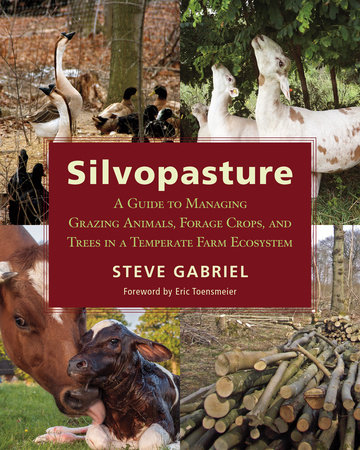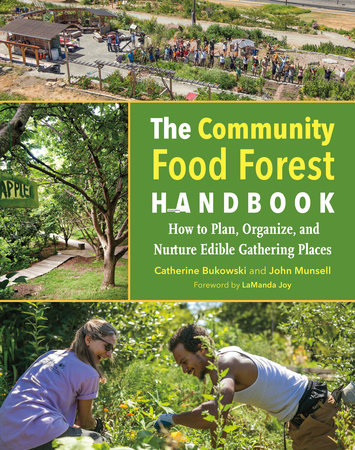Farming the Woods: An Integrated Permaculture Approach to Growing Food and Medicinals in Temperate Forests
Author Ken Mudge and Steve Gabriel, Foreword by John Munsell
- Publish Date: September 15, 2014
- Format: Trade Paperback
- Category: Gardening - Techniques - General
- Publisher: Chelsea Green
- Trim Size: 8 x 10
- Pages: 384
- US Price: $42.95
- CDN Price: $56.95
- ISBN: 978-1-60358-507-1
Reviews
Forests, Ken Mudge and Steven Gabriel write, have long been humanity’s pantry, where our species and many others have found the food, medicines and materials needed for survival. It is only within the last few hundred years, that we have become, as the saying goes, unable to see the forest for the trees. Land populated primarily with trees often only means lumber or an uncleared building site. Farming the Woods seeks to remind readers of those days, encouraging and enticing future forest farmers with thoughts of savory mushrooms, sweet saps, hearty nuts, and the rich meat of animals raised under the leaves, presenting all a farmer needs to begin making that dream a reality. Farming the Woods is sure to become a trusted companion for all farmer types. Whether one plans to solely work the forest or to use forested ground as a working farm, Ken Mudge and Steve Gabriel have crafted a tome destined to become a classic. The calm, friendly and knowledgeable voices of experience present a well-written book that will be useful for generations.”—Permaculture
"It seems that the only thing farming and forestry have in common is that they both take place outdoors. Yet, according the authors of this unorthodox but exceptionally useful handbook, 'forest farming,' which involves gathering a wide variety of plants, from mushrooms to medicinals, predates agriculture. Aiming their advice at readers living in temperate climate zones, including the upper half of North America, Mudge and Gabriel draw on their expertise in the rapidly emerging field of agroforestry to provide in-depth tips on cultivating mushrooms, gathering fruits and nuts, harvesting popular herbs such as ginseng, and even managing goats for maintaining canopy sheltered grasses and ornamentals. Along with sumptuous illustrations and invaluable case studies, their work provides a wealth of information for anyone with wooded land looking for ways to better manage it as well as reap a little extra profit from its rich agricultural potential.”— Booklist
“What a joy to read! Nice pictures, great case studies, and well organized. I can tell the authors put their heart and soul into this book. Farming the Woods is the source for temperate climate agroforestry, particularly for Northeast permaculture designers and teachers.”—Jonathan Bates, Owner of Food Forest Farm & contributing author of Paradise Lot
“My particular focus of research is in mushrooms, and Farming the Woods not only offers detailed methodology and techniques for woodland mushroom cultivation, but also adds insight on scheduling and calendars to help orchestrate yields in seasonal climates. I have always wanted to find this information on forest farming bundled together into a collaborative matrix with nut, berry, and rhizome production, and this book helps bridge sustainable agriculture and a healthy, circular systems approach. The authors urge us to take advantage of forested acreage we may have thought was unusable. Fill your forests with food!”—Tradd Cotter, author of Organic Mushroom Farming and Mycoremediation
“At last, a comprehensive forest farming guide for cool temperate climates! The authors have done a superb job explaining forest ecology and describing how to integrate fruits, nuts, mushrooms, medicinals, animals, and more into forest systems. A must-read for anyone interested in agroforestry, forest gardening, or utilizing forests for specialty crops.”—Martin Crawford, author of Creating a Forest Garden
"In this latest of the publisher’s serious, readable, and eminently useful books on cutting-edge permaculture practices, Cornell University professor Mudge and Fingerlakes forest farmer and horticulturalist Gabriel take a step outside the permaculture trend toward forest gardening—gardening that emulates forest patterns—and focus on farming in the woods by maintaining a healthy forest 'while growing a wide range of food, medicinal, and other non-timber products.' Beginning with a nuanced cultural history of forest farming, Mudge and Gabriel share their expertise on an abundance of woodland products: pollination techniques for paw-paws; the comparative economics of shiitakes and ginseng; maple, birch, and walnut sugaring methods; hazelnut breeding; and the safe use of a chain saw, to name but a few. A thoughtfully speculative but practical section on the possible effects of climate change reflects the authors’ humble and hopeful perspective that 'much of the trouble in the world today is due to disconnection from ... larger cycles. Forest farming invites us to change these cycles and to offer a gift for generations to come.’”—Publishers Weekly


